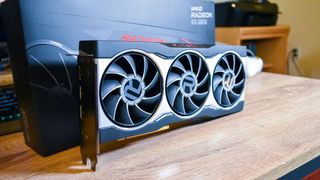Clever RSR tech will boost frame rates by up to 70% on AMD GPUs
Broadening AMD’s frame rate boosting horizons

AMD’s Radeon Super Resolution (RSR) could prove to be a major step towards smoother gaming, potentially allowing some PC games run up to 70% faster, or that’s the claim.
AMD just shared some further details on the frame rate boosting technology in a new YouTube video, after revealing RSR at CES 2022.
As you may recall, RSR is powered by FSR tech (FidelityFX Super Resolution), and both provide a frame rate boost (remember, FSR is AMD’s DLSS rvial), but work in very different ways. The key element of RSR is that it’s built into the Radeon driver, so can work across all games in theory (as opposed to FSR which must be supported by the developer in its game).
The central nugget of the video is the impact that RSR can make, and as mentioned in a best-case scenario, that’s a 1.7x increase in frame rate (when upscaling 1440p to 4K).
RSR is expected to arrive in the first quarter of 2022, so by the end of March in theory, though we can hope it turns up earlier.
Analysis: AMD is covering all its frame rate boosting bases
The boast of a 70% increase in fps (frames per second) is very impressive for this all-encompassing tech which can be applied to any game theoretically – but remember, this is ‘up to’ and results will doubtless vary considerably from game to game (and PC to PC).
RSR really opens up frame rate boosting, given that FSR is only supported by just under 50 games at the last count (although admittedly there’s another 20+ in the pipeline for the near future, including the imminent God of War on PC). It’s without doubt great news to get this much wider level of support, although how the quality of RSR’s upscaling will work compared to FSR remains to be seen.
Get daily insight, inspiration and deals in your inbox
Get the hottest deals available in your inbox plus news, reviews, opinion, analysis and more from the TechRadar team.
The other point to bear in mind here is that this is for (compatible) AMD graphics cards only, whereas FSR is capable of delivering results for Nvidia cards too (which is a real bonus for those who can’t access DLSS because they have an older GeForce card, or indeed for games that don’t support DLSS, of course).
- Check out all the best laptops around
Via Windows Central
Darren is a freelancer writing news and features for TechRadar (and occasionally T3) across a broad range of computing topics including CPUs, GPUs, various other hardware, VPNs, antivirus and more. He has written about tech for the best part of three decades, and writes books in his spare time (his debut novel - 'I Know What You Did Last Supper' - was published by Hachette UK in 2013).
